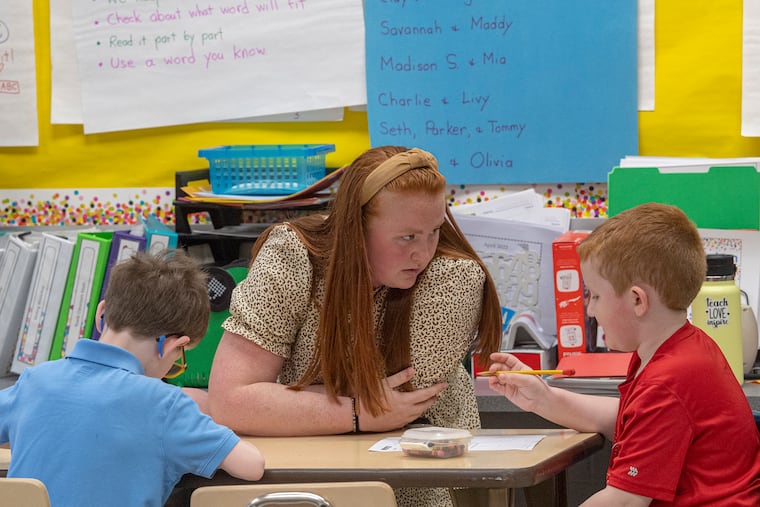Pa. lawmakers are proposing a $10,000 stipend to pay student teachers
With Maryland offering a similar stipend program and New Jersey considering one, Pennsylvania must follow suit “so we don’t lose talent to those other states,” State Sen. Vincent Hughes said.

To combat the waning pipeline of new teachers, Pennsylvania lawmakers are proposing to pay student teachers a $10,000 stipend — addressing one barrier to entry into the profession.
The plan, which would add another $5,000 for student teachers in certain priority areas, is intended to help attract educators amid a teacher shortage that has been pitting school districts — and states — against one another.
With Maryland offering a similar stipend program and New Jersey considering one, Pennsylvania must follow suit “so we don’t lose talent to those other states,” State Sen. Vincent Hughes said at a news conference at the Drexel University School of Education Thursday.
Hughes, a Democrat representing parts of Philadelphia and Montgomery Counties, and State Sen. Ryan Aument (R., Lancaster) introduced legislation to create the stipends, which Hughes said he would be pushing for over the coming weeks of state budget negotiations.
He was joined Thursday by education officials and advocates, as well as aspiring teachers who noted the financial burden they and others face while student teaching — a minimum 12-week requirement in Pennsylvania.
While student teaching last year at John Moffet Elementary in Kensington, Sydney Smith, a recent early childhood education graduate from Temple University, said she was performing many of the responsibilities of a full-time teacher — planning daily lessons, managing a classroom, and building community — while also shouldering bills for tuition, commuting, and other life expenses.
“Many of my fellow student teachers had to work evening shifts after student teaching in order to be able to financially support themselves,” Smith said, calling the proposed stipends “so important and necessary.”
Aaron Chapin, president-elect of the Pennsylvania State Education Association, said aspiring teachers have described facing significant challenges: Not only are they burdened with college debt, but “in many instances,” they’re forbidden from having second jobs while student teaching, Chapin said.
“These obstacles are preventing them from becoming future educators,” Chapin said.
The stipend proposal comes as Pennsylvania — and states nationally — are focused on growing the ranks of teachers. Across the country, the number of people completing teacher education programs fell 25% between 2011-12 and 2019-20, according to federal data.
The drop has been significantly steeper in Pennsylvania. Area school districts have been struggling to recruit qualified candidates; last year, the number of new educators without credentials outpaced teachers who earned certification. The state is also facing a shortage of teachers of color.
“We have to invest in the people we’re asking to dedicate their lives to our students,” said Donna-Marie Cole-Malott, codirector of the Pennsylvania Educator Diversity Consortium, noting that Philadelphia has been losing Black teachers.
Education groups have been pitching solutions, including increasing financial incentives; the head of Pennsylvania’s teachers’ union has called for a minimum $60,000 salary.
As part of his budget plan, Gov. Josh Shapiro proposed a tax credit of $2,500 a year for three years for newly certified teachers. Hughes said the stipend program would “complement” Shapiro’s proposal.
“Both can be done,” Hughes said, adding that the stipends were “not that expensive.” His staff estimated an annual cost of $50 million to $75 million.
On top of the $10,000 stipend, in areas that attract few student teachers or with “a high rate of open teaching positions,” student teachers would receive another $5,000, under the legislation. The Pennsylvania Higher Education Assistance Agency would determine qualifying areas.
Elsewhere in the country, Colorado, Michigan, and Oklahoma have enacted similar stipend programs, according to Hughes and Aument.